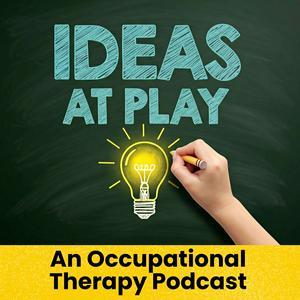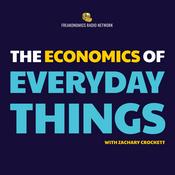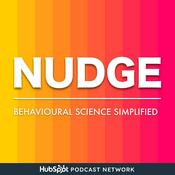53 episodes
- Drumming might not be the first intervention that comes to mind—but the evidence suggests it deserves a closer look for regulation, connection, and mental health for autistic individuals. We unpack what therapeutic drumming actually looks like (spoiler: no musical talent required), why a simple structure matters, and how rhythm can bring motor, sensory, and social skills together in one joyful intervention. If you’re curious about evidence-based strategies that feel meaningful, energizing, and genuinely fun—for both you and your clients—this episode is worth a listen. 🥁
We share our own thoughts in the Research Review and encourage you to read the original article too.
Friedman, Z. L., Ochoa, J., Prisco, D., & Seruya, F. M. (2023). Connected rhythm: A scoping review of therapeutic drumming as an intervention for autistic individuals. The Open Journal of Occupational Therapy, 11(4), 1–17. https://doi.org/10.15453/2168-6408.2133
💡Want to hear more about Ideas at Work or get on our waitlist? Send us an email to [email protected]
Stay informed, stay curious, and stay playful!
✏️ Sign up for our newsletter by clicking here.
📧 Email us a question or comment at [email protected]
👉 Find us on Instagram @ideas.at.play - Sensory tools are a staple in pediatric OT—but not all of them are doing what we think they are. In this episode, we take a clear-eyed look at the evidence behind sensory-based interventions, from weighted vests and fidgets to caregiver coaching and environmental modifications. Drawing from a recent systematic review, we discuss what actually supports participation, what shows mixed results, and how to make data-driven decisions without losing sight of day-to-day practice realities.
We share our own thoughts in the Research Review and encourage you to read the original article too.
Piller, A., McHugh Conlin, J., Glennon, T. J., Andelin, L., Teng, K., & Tarver, T. (2025). Systematic review of sensory-based interventions for children and youth (2015–2024). Frontiers in Pediatrics, 13, 1720179. https://doi.org/10.3389/fped.2025.1720179
Get the OT Evidence Checklist mentioned in the episode here
💡Want to hear more about Ideas at Work or get on our waitlist? Send us an email to [email protected]
Stay informed, stay curious, and stay playful!
✏️ Sign up for our newsletter by clicking here.
📧 Email us a question or comment at [email protected]
👉 Find us on Instagram @ideas.at.play - Episode 50 is all about YOU! Michele and Lacy tackle the questions that keep pediatric occupational therapists thinking, problem-solving, and sometimes scratching their heads. We dive into recommending OT service minutes with evidence (not guesswork) explore how AI can make your OT life easier while keeping therapy person-centered, and share prep hacks that save time without skimping on quality. Plus, we get real about finding mentorship and continuing education to fit you. It’s practical, honest, and full of those “aha!” moments that keep ideas—and your OT sessions—fresh and fun.
Articles/Resources mentioned:
Listen to episode 20 with Dr. Iona Novak and learn more about the READ Model in this article. Novak, I., Te Velde, A., Hines, A., Stanton, E., McNamara, M., Paton, M. C. B., Finch-Edmondson, M., & Morgan, C. (2021). Rehabilitation evidence-based decision-making: The READ model. Frontiers in Rehabilitation Sciences, 2, 726410. https://doi.org/10.3389/fresc.2021.726410
Listen to episode 40 with Dr. Heather Kuhaneck and read about the development of the Classroom Sensory Environment Assessment (C-SEA) at https://doi.org/10.5014/ajot.2015.019430
Thank you to our sponsor OccupationalTherapy.com! Use the code PLAY25 to support the show and get a free month of continuing education access when you sign up today at our podcast link https://fas.st/t/Fe79v8vU
💡Want to hear more about Ideas at Work or get on our waitlist? Send us an email to [email protected]
Stay informed, stay curious, and stay playful!
✏️ Sign up for our newsletter by clicking here.
📧 Email us a question or comment at [email protected]
👉 Find us on Instagram @ideas.at.play Ep. 49 Folinic Acid and Autism: Translating the Research for Occupational Therapy
2026/1/21 | 35 mins.Folinic acid has been showing up everywhere in conversations about autism—but what does the research actually tell us, and why should occupational therapists pay attention? In this episode of Ideas at Play, we break down a high-quality randomized controlled trial on folinic acid and translate the findings into practical, OT-relevant insights. We unpack the brain-based “why,” highlight what the study found (including changes related to autism characteristics and language), and talk about how this information fits into real-world practice. As always, we center participation, functional outcomes, and collaboration with families and medical teams. This episode is for informational purposes only and is not medical advice. Families should always consult their physician before starting or changing supplements or medications.
We share our own thoughts in the Research Review and encourage you to read the original article too.
Panda, P. K., Sharawat, I. K., Saha, S., Gupta, D., Palayullakandi, A., & Meena, K. (2024). Efficacy of oral folinic acid supplementation in children with autism spectrum disorder: A randomized double-blind, placebo-controlled trial. European Journal of Pediatrics, 183(11), 4827–4835. https://doi.org/10.1007/s00431-024-05762-6
Update 2/4/26: The article we featured by Panda et al. (2024) was retracted on 1/29/26. It was discovered that the authors handled the data inappropriately and the journal lost confidence in the findings. Despite this, there is still solid evidence supporting the use of folinic acid with autistic children. Here are a few additional articles that support the information provided in this episode.
Additional Citations:
Hoxha, B., Hoxha, M., Domi, E., Gervasoni, J., Persichilli, S., Malaj, V., & Zappacosta, B. (2021). Folic Acid and Autism: A Systematic Review of the Current State of Knowledge. Cells, 10(8), 1976. https://doi.org/10.3390/cells10081976
Rossignol, D. A., & Frye, R. E. (2021). Cerebral Folate Deficiency, Folate Receptor Alpha Autoantibodies and Leucovorin (Folinic Acid) Treatment in Autism Spectrum Disorders: A Systematic Review and Meta-Analysis. Journal of Personalized Medicine, 11(11), 1141. https://doi.org/10.3390/jpm11111141
Sener, E. F., Oztop, D. B., & Ozkul, Y. (2014). MTHFR gene C677T polymorphism in autism spectrum disorders. Genetics Research International, 2014, Article 698574. https://doi.org/10.1155/2014/698574
Bobrowski-Khoury, N., Ramaekers, V. T., Sequeira, J. M., & Quadros, E. V. (2021). Folate receptor alpha autoantibodies in autism spectrum disorders: Diagnosis, treatment and prevention. Journal of Personalized Medicine, 11(8), Article 710. https://doi.org/10.3390/jpm11080710
💡Want to hear more about Ideas at Work or get on our waitlist? Send us an email to [email protected]
Stay informed, stay curious, and stay playful!
✏️ Sign up for our newsletter by clicking here.
📧 Email us a question or comment at [email protected]
👉 Find us on Instagram @ideas.at.play- Everyone agrees that collaboration with teachers matters in school-based OT practice, yet many occupational therapists struggle to make it work in real life. In this episode, we go beyond polite check-ins and quick info-sharing to unpack what effective interprofessional collaboration really looks like. We unpack a qualitative study and the key ingredients that make collaboration work: protected time and space, trust and power-sharing, and turning shared ideas into real classroom action. This conversation reframes collaboration as something you build together, not just talk about.
We share our own thoughts in the Research Review and encourage you to read the original article too.
Quigley, D., & Smith, M. (2022). Achieving effective interprofessional practice between speech and language therapists and teachers: An epistemological perspective. Child Language Teaching and Therapy, 38(2), 126–150. https://doi.org/10.1177/02656590211064544
💡Want to hear more about Ideas at Work or get on our waitlist? Send us an email to [email protected]
Stay informed, stay curious, and stay playful!
✏️ Sign up for our newsletter by clicking here.
📧 Email us a question or comment at [email protected]
👉 Find us on Instagram @ideas.at.play
More Business podcasts
Trending Business podcasts
About Ideas at Play: An Occupational Therapy (OT) Podcast
Welcome to Ideas at Play, the go-to podcast for busy pediatric occupational therapy professionals! Whether you're in school-based settings, early intervention, or outpatient practice, we bring you evidence-based strategies, practical tips, and engaging discussions to support your OT practice with children, teens, and young adults.Each episode features:A deep dive into recent pediatric OT research and how to apply it."Nailed It or Failed It," where we share what’s working—and what isn’t—in our pediatric OT practice.Real-world examples and listener questions about all things pediatric occupational therapy.Shout outs to People, Places, and Products that fill our occupational therapy heartsJoin the hosts, Michele Alaniz, OTD, OTR/L, BCP and Lacy Wright, OTD, OTR/L, BCP, as we explore innovative OT ideas, share professional insights, and help you stay up-to-date with the latest trends in pediatric occupational therapy. Subscribe now and unlock actionable strategies to help the children you serve thrive!Stay informed, stay curious, and stay playful!✏️ Sign up for our newsletter https://forms.gle/2aceiDDHBq6LR5TV6.📧 Email us a question or comment at [email protected]👉 Find us on Instagram @ideas.at.playKeywords: occupational therapy, OT, pediatric occupational therapy, evidence based practice, peds OT
Podcast websiteListen to Ideas at Play: An Occupational Therapy (OT) Podcast, Honest Money and many other podcasts from around the world with the radio.net app

Get the free radio.net app
- Stations and podcasts to bookmark
- Stream via Wi-Fi or Bluetooth
- Supports Carplay & Android Auto
- Many other app features
Get the free radio.net app
- Stations and podcasts to bookmark
- Stream via Wi-Fi or Bluetooth
- Supports Carplay & Android Auto
- Many other app features


Ideas at Play: An Occupational Therapy (OT) Podcast
Scan code,
download the app,
start listening.
download the app,
start listening.
































